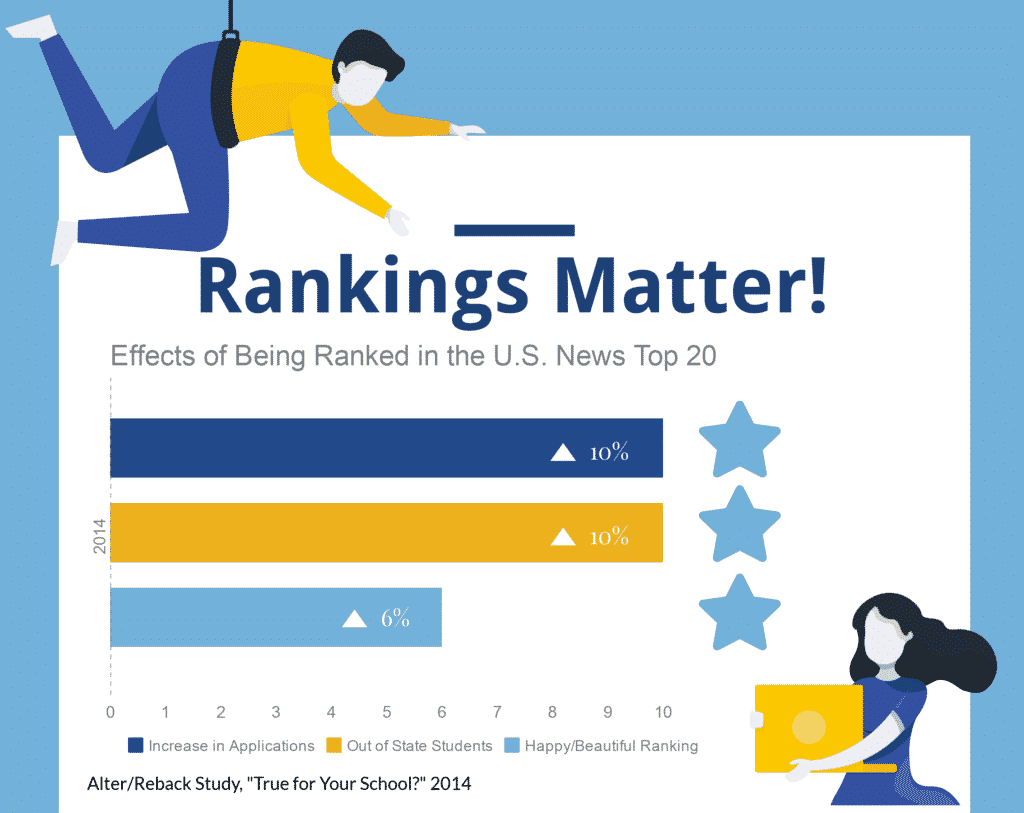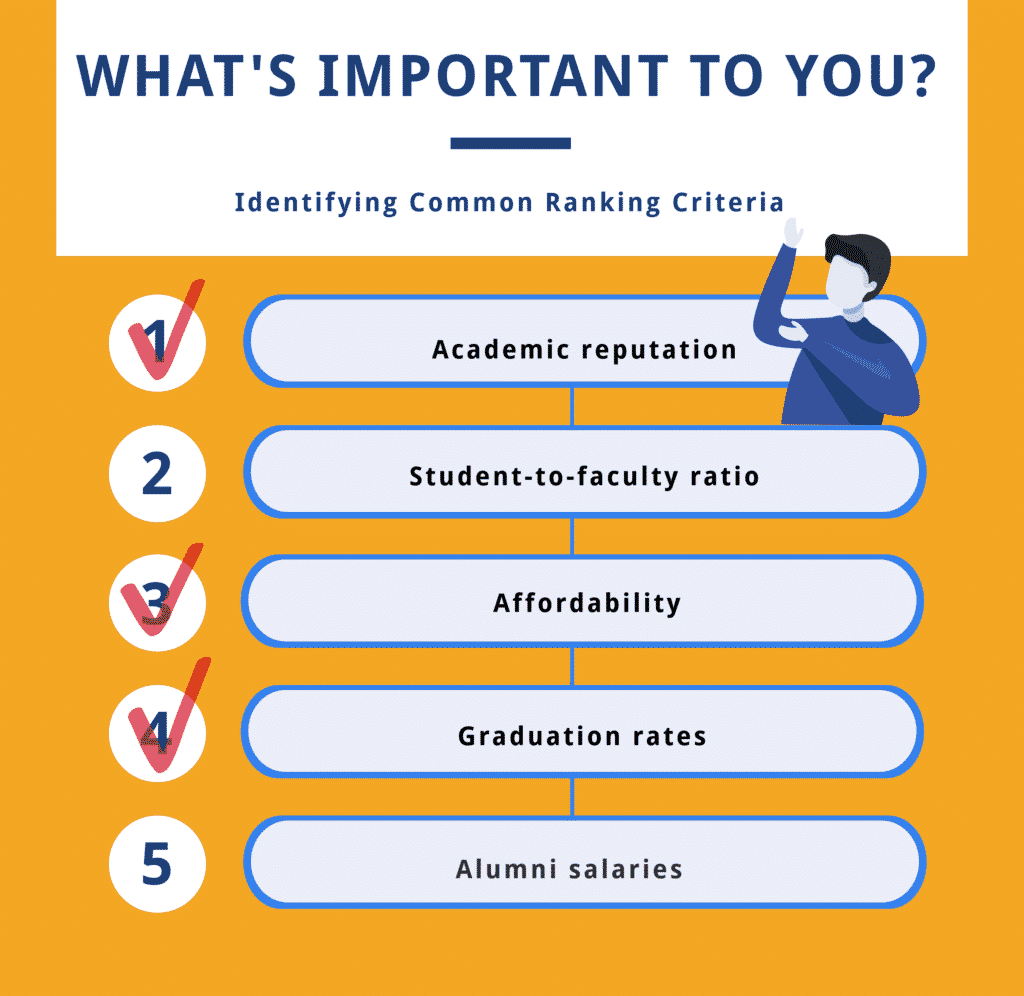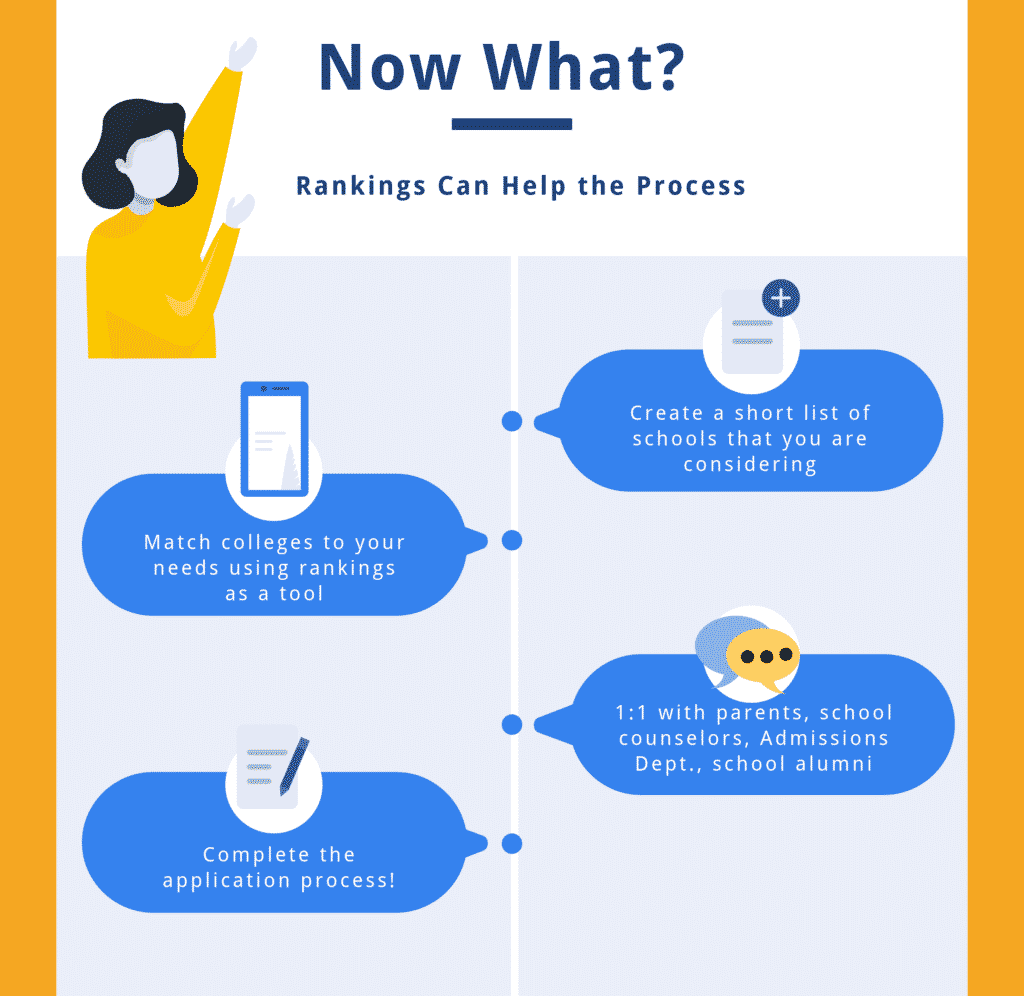- Unigo
- My Plan
- Niche
- Grad Reports
- U.S. News Reviews
- Unigo
- U.S. News
- My Plan
- Washington Monthly
- Niche
- Forbes
- Grad Reports
- Wall Street Journal
- U.S. News Reviews
- Wallet Hub
Featured 2024 Consensus Rankings











Recommended Online Schools & Programs
Explore our featured online programs to find the right match for you today.
Best Online Colleges in Every State
College reputation rankings are everywhere online and students will notice a number of disparities between them. A college ranked #3 on one list may not even appear in the Top 100 of another list. Although college rankings are important, a student should not use a college rankings list alone to make his or her final admissions decision. The student must research key aspects of the college—including location, graduation rates, and available programs of study—to also make their choice. Conveniently, legitimate college rankings sites include these details alongside their ratings (spam sites will generally be very vague about their methodology, if not downright evasive).

An example of a college rankings list many prospective students review is U.S. News & World Report (one of the sources for the College Consensus aggregate rankings). College ranking sites, like U.S. News & World Report, set their own criteria for rating each university. U.S. News & World Report relies on 16 measures to rate each college in the nation. Before making their final rating decisions, the publication reviews five main components:
- Student outcomes
- Faculty resources
- Expert opinion
- Financial resources
- Student excellence
Within each of these five factors, the college rankings website will look at a variety of indicators to score the university. As an example, student outcomes are determined through graduation and retention rates, graduation rate performance, and social mobility. The college ranking system is not only used to rate national universities, but also regional colleges and universities. Sub-categories are extremely valuable for students looking at ratings for colleges in a desired location or with a certain academic major.
This is just one example of a multitude of ranking methodologies. Some organizations, like the Social Mobility Index, are interested in how colleges help their students advance and succeed; some, like Wallethub, are interested in value. Remember: college rankings are only valuable if they’re measuring factors that matter to you.
Best National Rankings:
Best Colleges & Universities
Best National Research Universities
Best National Liberal Arts Colleges
Best Public Colleges & Universities
How Important are College Rankings?
College reputation rankings from objective data is always more useful to students than a college ranking system with subjective information. Objective data uses hard facts to rate the school: tuition costs, test scores, graduation rates, and post-collegiate job placement. A subjective college rankings website will rate universities based on student life, professor ratings submitted by students, and personal student feedback. Although student feedback could help provide an overall feel of a particular university, the college ranking system is not based on hard facts. The College Consensus difference is in bringing all of these into one ranking method.
College reputation rankings are useful for prospective students who are just starting to search for a university to attend. The rankings can give the student a sense of how a college compares when held up against similar universities. Rankings will not only rate a college, but also typically give an overview of the college’s strengths. For instance, a student may find it useful to see that the college has highly rated degree programs in the field of education and nursing. The rankings can also provide a sense of whether the student has a chance for acceptance into the college. As an example, college rankings lists will often give statistics on acceptance rates and median SAT scores.
Another way a college rankings website can help is narrowing down the student’s choices. If a student is stuck between two or more colleges, the ranking could guide his or her final decision. When a college is ranked considerably higher by a trusted organization than the student may choose to look further into the university’s offerings.
Prospective students often wonder “do college rankings matter to employers?” In many cases, a college ranking helps build the institution’s reputation. Employers are more likely to award entry-level jobs to candidates who attend colleges that are known for student achievements.
One major drawback of college rating systems is that universities will use college rankings sites to advertise their academic programs. Many college rankings sites don’t reveal their ranking criteria, but colleges will still use their high ratings in solicitations. Students may believe a college’s claim of being the #1 College in the Southeast without looking for further proof of the claim. For publications that do reveal their rating criteria, prospective students will want to look at the sources used to collect the data. For instance, data collected through the National Center for Educational Statistics is considered valid since the government regulates the agency. College rankings sites that do not use trusted sources to collect data for their ratings should not be used. Keep in mind many college rankings rely on data provided directly from the college. This is problematic since it creates a conflict of interest.
Online rankings not only rate the college’s overall performance. College rankings sites can also provide a student with insight about attributes that may be important to them. For instance, colleges are also rated as “Most Diverse,” “Best Value,” “Best for Veterans,” and numerous other categories.
Best Regional Rankings:
Best Regional Colleges – North
Best Regional Colleges – South
Best Regional Colleges – Midwest
Best Regional Colleges – West
Best Regional Universities – South
Best Regional Universities – Midwest
Best Regional Universities – West
Best Regional Universities – North
How Should You Research Colleges?

To find the best universities in USA, students and their parents will have to devote some time to researching the top colleges. World college rankings are not the sole way to find the best college or university. However, the rankings can provide prospective students with access to key data about the school such as faculty to student ratio, graduation rates, and number of college majors offered.
Before researching any colleges, students should write down a list of what’s most important to them. For instance, are they looking for the best East Coast colleges with NCAA Division I sports teams? Or, do they prefer attending one of the top colleges in the South with superior STEM departments? Are they supportive of minority students? Do they provide resources for mental health, or for visually impaired and hearing impaired students? Most students use location, campus size, tuition cost, and academic reputation to choose the best universities in USA for them. A sample “must have” list for a student may look like:
- Close to home
- Large campus
- Competitive engineering department
- Low in-state tuition
- Ranked as one of the Best East Coast Colleges
Once top requirements are decided, a student may use less significant factors to compare colleges. For instance, the prospective student may have a strong interest in Greek life and prefer a college that can offer the experience. Or the student may have preferences about the type of on-campus housing available to undergraduate students.
College ranking websites are useful during the research process, but should not be the only tool utilized by prospective students. After checking rankings, students should also review official college websites for details about the university. Look beyond slogans on college websites like “#2 Top Colleges in the South.” On the website, students can learn more about academic requirements for desired majors. Questions answered on college websites include:
- What are the major courses required?
- What electives are available?
- What types of internship programs are offered?
- What is the size and faculty ratio for each major academic department?
Social factors are harder to research on college-sponsored websites. Each university will want to paint a rosy picture of campus life. Prospective applicants can find certain details about campus life from official sources, such as dining options and college clubs, but other background information requires further investigation. Unigo and similar student rating websites are useful to check out what others are saying about the college. However, the best bet for graduating high school students is to attend college tours. This allows students and parents to attend seminars that give an overview about the college and walk around to see classrooms and dormitories. Some colleges also have overnight campus visits where prospective students can spend a night staying in the dormitory of a current college student. This gives a first-hand look at dormitory life and offers a chance to talk to other students to get their opinions on what life is really like at the university.
Don’t dwell on rankings if everything else about a college sounds like a good fit. For instance, world college rankings can be flawed or skewed. If going to a highly ranked college is important, research the college’s ratings from multiple sources. Examples of widely accepted sources besides U.S. News & World Report, include Forbes Magazine, Princeton Review, and the Wall Street Journal. Read about how each publication ranks a college and keep in mind factors that could undermine a college’s rating. As an example, publications that rely on college-submitted survey data may not rank colleges that didn’t submit surveys.
Best Niche Rankings:
Best Christian Colleges & Universities
Best Historically Black Colleges & Universities
Best Women’s Colleges
Best Catholic Colleges & Universities
100 Most Affordable Colleges & Universities
100 Best Small Colleges
Can You Trust College Rankings?
Reliable college rankings are difficult to come by. Anybody on a website has the means to create lists that rate colleges from best to worst. Transparency is key to finding the most reliable university ranking website. The exact methodology should be detailed to see what the publication is valuing the most. As one example, U.S. News & World Report uses 35 percent student outcomes to rank national colleges. The Princeton Review scores colleges on a scale from 60-99 and uses admissions selectivity, financial aid, demographics, and quality of life to generate a numerical score. Students who are looking for reliable college rankings want to uncover how the data was collected too. Princeton Review uses student answers to survey questions while U.S. News & World Report gets any missing data not provided through the school from the National Center for Education Statistics. The source of ranking data will have a dramatic impact on how a college measures up.
Another issue with college rankings is that the numbers don’t always paint a clear picture of what the university is really like. For instance, many ranking websites highlight small classes as a positive attribute. However, small classes just might mean the courses are filled quickly and fewer students have access to them because of limited availability. (This is usually an advantage for small liberal arts colleges with good reputations.) Another issue is that certain rankings include the “academic reputation” of a college. This is based off of how students and faculty at other colleges perceive the programs at any given university. With any rankings based off of the opinions of others and not hard facts, there is a chance they are not accurate.
A common question is “What is the best college ranking list?” Although U.S. News & World Reportis the most well known source of college rankings, it does not necessarily make it the best. One issue with the U.S. News & World Reportis that approximately 150 colleges are unranked. The publication does not rank colleges with small student bodies, no regional accreditation, and with limited returned peer survey results.
Another concern is that U.S. News & World Report is no longer the most reputable university ranking system because of colleges “gaming” the system. Schools like Northeastern University have admitted to being able to work the rating criteria to their favor and move up the list. Northeastern was once ranked as #162 for National Universities, but have risen to the Top 40 National Universities. One of the college’s strategies to improve their rankings was to not require SAT scores for international students while simultaneously recruiting students from abroad. The idea behind this was to lower the college’s reported acceptance rate and increase SAT averages.
In the past, colleges have also submitted inaccurate data to improve their rankings. George Washington University and Bucknell University are two colleges that have given incorrect admissions data to theU.S. News & World Report. The publication has made more stringent quality assurance guidelines to verify data. Analysts review any flagged data and the college may be asked to confirm or revise their submissions.
The most reputable college ranking website will provide sources and be forthcoming about any data missing or unconfirmed. For instance, Forbes Magazine has used Facebook surveys to compile rankings of colleges. The publication asked students at colleges to rate their satisfaction levels from 1 to 5. Rankings based mostly off of surveys have too much subjectivity to offer much benefit to students trying to decipher the best universities in the nation.
The most reputable college rankings will serve an important purpose: introduce students to colleges that may not have been on their radars. Ivy League schools benefit from widespread name recognition, but college ranking lists also rate lesser-known colleges that are still excellent schools. The hard figures provided through a trustworthy college ranking site are useful for students who are unsure if they will meet the admissions criteria. Students can check average SAT/ACT scores and average high school GPAs of the student body.
How Do I Find the Best College for My Major?

A tricky part of researching colleges and universities is deciding on the school that is best for the student’s desired major. Websites providing ranking by major is an invaluable resource for prospective students. Students want a college that has a strong and competitive academic department for their desired majors.
Before looking at rankings by major for each college, prospective applicants must first look if the university even offers the major. If the college does have the major, students should review the curriculum. Each college has different graduation requirements. Incoming college freshman should check major courses, general education courses, electives, and internships needed for graduation.
Besides reviewing major requirements, college applicants should check out outcomes for students who have graduated from the department. Students should check on graduation rates and job placement after graduation. Getting answers to the following questions can assist students in finding the best college for their majors:
- What type of positions are students securing after graduation?
- How long does it take for graduates to find a position after college?
- What is the average GPA and test scores for current students?
- How many students move on to graduate school?
If any of this data cannot be located online, check with the college’s department directly and request the statistics. The college may also have salary data available for review. For instance, the University of Pennsylvania reported that graduates from computer related majors had an average salary in excess of $85,000 annually in 2014.
Students should reach out to former graduates to get feedback on the college’s major program. Find out their opinions on the program and how the college aided in their successes and failures. Current students in the program can also be a resource of insider information. Current students can discuss major courses and faculty members. Additionally, check the biographies of the faculty within the department. If faculty members are highly respected in their fields, then students can rest assured that the department has a good reputation in the professional community.
College rankings by major are available through websites such as Education Corner and U.S. News & World Report. College rankings by major are typically determined by peer assessment surveys. The rankings may be composed of graduation rates, post-graduation retention rates, and average GPA. Other factors like faculty pay could be used to compile college rankings by major. The idea is higher paid faculty attract better professors to the department. Websites may require other criteria for given a ranking by major. As one example, the U.S. News & World Report only reports a ranking by major for business programs that have accreditation through the Association to Advance Collegiate Schools of Business.
When many students enroll in colleges, they don’t know which majors to select. In this case, prospective applicants should compare multiple departments at the college. For instance, a student with an interest in the humanities, he or she should research the college’s Philosophy, English, and History departments. Ideally, a student will want a general idea about academic areas that interest him or her. A college with a superior elementary education department may not have a solid program for engineering students or vice versa.





